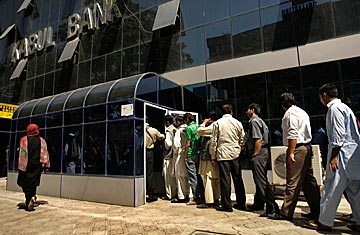
Afghan men wait to enter Kabul Bank to withdraw money in Kabul, Sept. 4, 2010
You can see the anxiety over the fate of Afghanistan's economy just by looking at the huge line of depositors gathered furiously outside the headquarters of Kabul Bank in the downtown section of the capital. Hundreds thronged the sidewalks Sunday, spilling into a street wreathed in newly laid coils of concertina wire. Armed security guards tried in vain to tamp down tempers that flared despite reports of a possible bailout being orchestrated by the government with the help of U.S. experts. Occasional scuffles broke out between police and nervous depositors, many of whom arrived in the predawn hours to withdraw funds. (Sunday is a workday in Afghanistan.) Intermittent pleas to the crowds by bank officials for patience and understanding were met with angry variations of the same demand: We want our money back.
The run on Kabul Bank is shaking the country's fragile economy — and fraying what's left of trust in the government. Last week the Central Bank removed Kabul Bank's chairman and chief executive officer after it was learned that the bank had allegedly funneled tens of millions of dollars into risky Dubai property investments and had reportedly given large loans to shareholders with close links to the administration of President Hamid Karzai, including his brother Mahmoud as well as a brother of the country's first Vice President. While complaints over systemic graft have been a common refrain among ordinary Afghans unhappy with their government, the prospect — however real or distant — of personal deposits falling into jeopardy due to alleged insider dealings has struck a sharp chord for many already living on edge in the capital.
"Corruption and nepotism are rotting the system, both public and private," says Aminullah Ahmadi, 20, a university student. After waiting several hours to empty his entire $15,000 account, some of which was going to go toward paying tuition for a school he was attending overseas, the business-management major was told by a friend working inside the bank that he would only be able to withdraw up to $10,000 — if he made it inside the bank building before closing time.
A few shoulders away, Fida Muhammad, 39, the owner of a construction company, fingered prayer beads as he waited to take home his $80,000 life savings, a decision he said he made that morning as the situation appeared to be "getting out of control." He recalled how a few weeks back he allegedly had to pay a $5,000 bribe to have his company's license renewed by the government. "There are no standards in our banking system or our government," he says. "How can we trust anymore?"
Set up with U.S. financial assistance following the Taliban's ouster, the Afghan banking system is young yet already deeply integrated into the country's affairs. Of the country's banks, Kabul Bank controls perhaps 40% of the industry, until last week holding deposits of around $1.3 billion, spread out over 1 million accounts — among them the accounts of some 250,000 public employees. But, according to insiders, toothless oversight by the country's central bank has allowed well-connected business interests to abuse the system. "Everyone knew a year ago — even before that — that Kabul Bank was going to crash," says a top executive at another major private bank. Given Kabul Bank's lopsided role in the country's banking sector, he reckons that a couple of smaller banks with liquidity troubles may also fail if the crisis of confidence deepens. "If in five years [Kabul Bank] can fail so dramatically," he says, "then you have to have doubts and misgivings about others."
The veteran banker, who plans to leave Afghanistan for a more stable financial scene, lays most of the blame at the feet of the Karzai administration. But he also levels sharp criticism at foreign governments and companies for "shirking responsibility to help regulate the banking system" while injecting billions into the country through dubious financial institutions.
Anywhere from $200 million to $250 million has been withdrawn from Kabul Bank's coffers over the past four business days. While details of the rescue effort are not yet clear, the Afghan government maintains it has enough to keep Kabul Bank open and guarantee all depositors' accounts. On Saturday, American officials said the Central Bank had transferred $300 million from its reserves in the U.S. Afghan officials further insist that the media has exaggerated the bank's vulnerability and the sense of panic felt by depositors. The officials say there are reasons other than panic for depositors wanting to withdraw cash. Indeed, the banking crisis has coincided with the end of the month, when people typically withdraw their monthly salaries, and the officials also note the approach of 'Id al-Fitr, a free-spending Muslim holiday that marks the close of Ramadan, the austere month of traditional fasting.
Not that religion makes financial transactions any cleaner. Across the street from Kabul Bank's headquarters, another crowd gathered at the metal gates of a secondary branch for depositors seeking to go on the hajj, the holy pilgrimage to Mecca. They said they had already paid almost $3,000 to make the once-in-a-lifetime journey but that the Ministry of Hajj and Religious Affairs was asking them to pay another $275 to finalize the arrangements. A half-dozen men grumbled that the shortfall must be due to troubles within Kabul Bank. Said Fazluddin, a 70-year-old farmer seated on a bag of concrete mix: "Nothing is sacred here."
